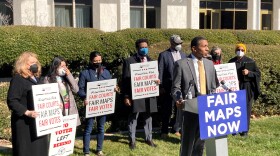For most people, going to Honduras for a month and a half during the summer seems like a dream come true.
However, for 19-year-old Brayan Guevara, it was like a prison sentence.
"I was looking at it as a punishment for me," he said. "I was like, 'I'm going to hate this trip. I'm moving away from my friends. I'm already having problems with my girl and moving away for a month and a half or two months is going to end things."
But it turns out that Guevara almost flunking out of college and going to Honduras to avoid any distractions was actually a blessing in disguise, as it helped him fully appreciate his Afro-Latino identity.
Life in Greensboro
When he was a freshman, Guevara attended Winston-Salem State University and worked in Burlington. Every day, he left the home he shared with his mother, and drove to Winston-Salem for classes. Then would have to drive in the opposite direction to go to work.
That schedule was taxing on Guevara, but it also didn't help that he simply chose not to do his coursework.
"I felt like other things were more important at the time," he said. "Like chillin' with my homies, or chillin' with my girlfriend at the time."
Guevara's mother is a professor at the University of North Carolina at Greensboro. He said she knew something was wrong and when he showed her his grades, she decided to send him to Honduras.
"She wanted me to get out of my environment," he said. "I could get distracted very easily and her being my mom, she knows that. She felt in her way that going to Honduras and being secluded from all these distractions in North Carolina will benefit me in the long run and in the future."
Life in Honduras
Guevara stayed in Trujillo, a city in Honduras.
"We finally get to the house that I'm going to ultimately stay in for a month and a half and it's really nice," he said. "The inside looks really nice, but the neighborhood that they (his family) live in is really scummy. It'll probably be the equivalent of the projects of the United States, but on the inside, it looks like a palace."
Life in Honduras for Guevara consisted of making local Honduran dishes with his family, playing with his cousins and, of course, going to parties.
Guevara went to his first party with his cousin Nelson. It was a big celebration near the beach where there was dancing, music and games as well as contests where they deem the "prettiest of Trujillo." Then it came time for the teenagers to have their party after all the children left. Guevara went in thinking that the dancing would be similar to the U.S.
He was wrong.
"I go down there and you know they're not twerking at all, like it's not twerking there. They're doing this thing called punta and punta. It's kind of like twerking but it's not. You got to use more of your hips than your glutes."

Needless to say, Guevara didn't know what to do when girls would dance punta with him and he was determined to never be embarrassed on a Honduran dance floor again.
"That night I came back to my house and put on some music. I was like, 'I'm gonna get this right,'" he said.
He spent most of his time practicing and going to more parties to get better at dancing punta. By the time his cousin's quincñiera rolled around, Guevara felt more than confident with his punta skills.
"I see this girl that's been eyeing me all night. Her name's Nina. She was eyeing me; I was eyeing her," he said. "It's punta. It’s my time to shine. I've been, focusing on just punta. I didn't know punta can have tricks though. I guess she had this song memorized ... so you got to stop for a second and then you got to keep punta-ing but then you gotta go low. So everybody was doing it. I’m like 'what is going on?' I was not ready for it."
Returning to North Carolina
While his time in Honduras consisted of family time and parties, when he returned Guevara felt more confident in who he was as an Afro-Latino man.
He said in the past he tried to hide who he really was.
"I feel like in North Carolina, you have to fit in one lane in order to be cool," he said. "That’s when I was trying to forget my Afro-Latino descent and just, you know, try to fit into that lane for a certain period of time when I was young. Honestly, I was always trying to fit that lane until I went to Honduras."
Guevara feels like his Afro-Latino identity shines through in every aspect of who he is now.
"When I came back, my playlist and songs has changed to like Caribbean music, Spanish music because that's what I was around," he said. "I was in a car with some of my friends and you know, it's my turn to be on the auxiliary cord. I play this music and they're like, 'Brayan, what happened to you?' I feel like that's how it kind of changed me a little bit, you know, with accepting my identity."








